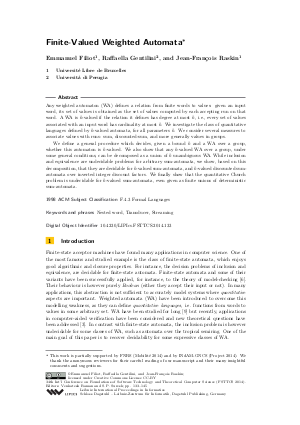Finite-Valued Weighted Automata
Authors Emmanuel Filiot, Raffaella Gentilini, Jean-Francois Raskin
-
Part of:
Volume:
34th International Conference on Foundation of Software Technology and Theoretical Computer Science (FSTTCS 2014)
Part of: Series: Leibniz International Proceedings in Informatics (LIPIcs)
Part of: Conference: IARCS Annual Conference on Foundations of Software Technology and Theoretical Computer Science (FSTTCS) - License:
 Creative Commons Attribution 3.0 Unported license
Creative Commons Attribution 3.0 Unported license
- Publication Date: 2014-12-12
File

PDF
LIPIcs.FSTTCS.2014.133.pdf
- Filesize: 484 kB
- 13 pages
Document Identifiers
Subject Classification
Keywords
- Nested word
- Transducer
- Streaming
Metrics
- Access Statistics
-
Total Accesses (updated on a weekly basis)
0Document
0Metadata
Abstract
Any weighted automaton (WA) defines a relation from finite words to values: given an input word, its set of values is obtained as the set of values computed by each accepting run on that word. A WA is k-valued if the relation it defines has degree at most k, i.e., every set of values associated with an input word has cardinality at most k. We investigate the class of quantitative languages defined by k-valued automata, for all parameters k. We consider several measures to associate values with runs: sum, discounted-sum, and more generally values in groups. We define a general procedure which decides, given a bound k and a WA over a group, whether this automaton is k-valued. We also show that any k-valued WA over a group, under some general conditions, can be decomposed as a union of k unambiguous WA. While inclusion and equivalence are undecidable problems for arbitrary sum-automata, we show, based on this decomposition, that they are decidable for k-valued sum-automata, and k-valued discounted sum-automata over inverted integer discount factors. We finally show that the quantitative Church problem is undecidable for k-valued sum-automata, even given as finite unions of deterministic sum-automata.
Cite As Get BibTex
Emmanuel Filiot, Raffaella Gentilini, and Jean-Francois Raskin. Finite-Valued Weighted Automata. In 34th International Conference on Foundation of Software Technology and Theoretical Computer Science (FSTTCS 2014). Leibniz International Proceedings in Informatics (LIPIcs), Volume 29, pp. 133-145, Schloss Dagstuhl – Leibniz-Zentrum für Informatik (2014)
https://doi.org/10.4230/LIPIcs.FSTTCS.2014.133
BibTex
@InProceedings{filiot_et_al:LIPIcs.FSTTCS.2014.133,
author = {Filiot, Emmanuel and Gentilini, Raffaella and Raskin, Jean-Francois},
title = {{Finite-Valued Weighted Automata}},
booktitle = {34th International Conference on Foundation of Software Technology and Theoretical Computer Science (FSTTCS 2014)},
pages = {133--145},
series = {Leibniz International Proceedings in Informatics (LIPIcs)},
ISBN = {978-3-939897-77-4},
ISSN = {1868-8969},
year = {2014},
volume = {29},
editor = {Raman, Venkatesh and Suresh, S. P.},
publisher = {Schloss Dagstuhl -- Leibniz-Zentrum f{\"u}r Informatik},
address = {Dagstuhl, Germany},
URL = {https://drops.dagstuhl.de/entities/document/10.4230/LIPIcs.FSTTCS.2014.133},
URN = {urn:nbn:de:0030-drops-48388},
doi = {10.4230/LIPIcs.FSTTCS.2014.133},
annote = {Keywords: Nested word, Transducer, Streaming}
}
Author Details
References
-
U. Boker and T. A. Henzinger. Determinizing discounted-sum automata. In CSL, pages 82-96, 2011.

-
V. Bruyère, N. Meunier, and J-F. Raskin. Secure equilibria in weighted games. In LICS, 2014. to appear.

-
K. Chatterjee, L. Doyen, and T. A. Henzinger. Quantitative languages. ACM Trans. Comput. Log, 11(4), 2010.

-
K. Chatterjee, V. Forejt, and D. Wojtczak. Multi-objective discounted reward verification in graphs and mdps. In LPAR, pages 228-242, 2013.

-
C. Choffrut. Une caractérisation des fonctions séquentielles et des fonctions sous-séquentielles en tant que relations rationnelles. Theor. Comput. Sci., 5(3):325-337, 1977.

-
E. Clarke, O. Grumberg, and D. Peled. Model Checking. The MIT Press, Cambridge, Massachusetts, 1999.

-
R. de Souza. On the decidability of the equivalence for k-valued transducers. In Developments in Language Theory, pages 252-263, 2008.

-
R. de Souza and N. Kobayashi. A combinatorial study of k-valued rational relations. Journal of Automata, Languages and Combinatorics, 3/4(13):207-231, 2008.

-
M. Droste, W. Kuich, and H. Vogler. HandBook of Weighted Automata. Springer, 2009.

-
E. Filiot, R. Gentilini, and J-F. Raskin. Quantitative languages defined by functional automata. In CONCUR, pages 132-146, 2012.

-
T. V. Griffiths. The unsolvability of the equivalence problem for -free nondeterministic generalized machines. Journal of the ACM, 1968.

-
E. Gurari and O. Ibarra. A note on finitely-valued and finitely ambiguous transducers. Mathematical Systems Theory, 16(1):61-66, 1983.

-
K. Hashiguchi, K. Ishiguro, and S. Jimbo. Decidability of the equivalence problem for finitely ambiguous finance automata. IJAC, 12(3):445, 2002.

-
I. Klimann, S. Lombardy, J. Mairesse, and C. Prieur. Deciding unambiguity and sequentiality from a finitely ambiguous max-plus automaton. TCS, 327(3):349-373, 2004.

-
D. Krob. The equality problem for rational series with multiplicities in the tropical semiring is undecidable. Int. Journal of Algebra and Computation, 4(3):405-425, 1994.

-
M. L. Minsky. Computation: Finite and Infinite Machines. Prentice-Hall, 1967.

-
K. S. Rao and G. Sullivan. Detecting cycles in dynamic graphs in polynomial time. In Proc. STOC'88, STOC, pages 398-406. ACM, 1988.

-
J. Sakarovitch and R. de Souza. On the decidability of bounded valuedness for transducers. In Proc. MFCS 2008, MFCS. Springer-Verlag, 2008.

-
J. Sakarovitch and R. de Souza. Lexicographic decomposition of k -valued transducers. Theory Comput. Syst, 47(3):758-785, 2010.

-
H. Seidl. Equivalence of finite-valued tree transducers is decidable. Mathematical Systems Theory, 27(4):285-346, 1994.

-
A. Weber. On the valuedness of finite transducers. Acta Informatica, 27(8):749-780, 1989.

-
A. Weber. Finite-valued distance automata. TCS, 134(1):225-251, 7 November 1994.

